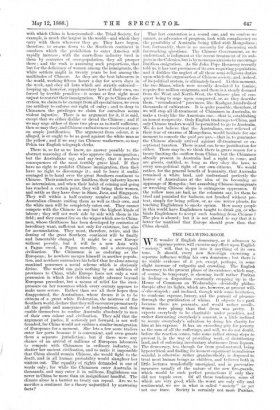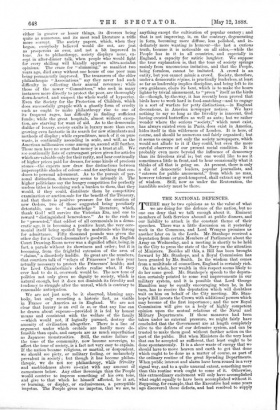THE DRAWING-ROOM.
WE wonder if English democracy, as it advances to supreme power, will exercise any effect upon English "society," will, that is, put into it anything of its own tone. It should, every new Sovereign exercising a separate influence within his own dominion ; but there is no visible evidence of it yet, except, perhaps, in some slight increase of vulgarity and crowding. The English democracy in the present phase of its existence, which may, of course, be temporary, is showing itself rather Puritan in feeling—a disposition constantly cropping up in the House of Commons on Wednesdays—decidedly philan- thropic after its lights, which are, however, at present will- o'-the-wispish ; and inclined, though with some hesitation, to condemn expense, luxury, and the pursuit of pleasure through the gratification of whims. It objects to a park because there are peasants, and would rather needle- women were plump than that dress was pretty. It expects everybody to be charitable under penalties, and rather distrusting everybody's consent, is a little inclined to secure everybody's salvation by doing his charity for him at his expense. It has an exceeding pity for poverty as the sum of all the sufferings, and will, we do not doubt, before the reaction comes, take some rather strong steps to prevent it, in the way of providing work, of distributing land, and of enforcing involuntary abstinence from liquors. The democracy, too, though far from good-natured, being hypercritical, and finding its keenest enjoyment in malicious scandal, is otherwise rather grandmotherly, is disposed to treat most human beings as children, and believes both in little lectures wonderfully unoriginal, and in preventive measures usually of the nature of the new fire-guards, which would be such perfect protections if only they did. not topple over. Of all these tendencies, some of which are very good, while the worst are only silly and sentimental, we see in what is called " society " as yet not one trace. Society is certainly not more Puritan, either in greater or lesser things, its divorces being quite as numerous, and its most read literature a trifle more corrupt. The society papers, which, -when they began, everybody believed would die out, are just as prosperous as ever, and not a bit improved in tone. As to philanthropy, society displays none, ex- cept in after-dinner talk, when people who would fight for every shilling will blandly approve ultra-socialist opinions. The craze for "slumming," so manifest two years ago, died away without one house of one poor man being permanently improved. The treasurers of the older philanthropic " Associations " say they never had such difficulty in collecting their annual revenues ; while those of the newer "Committees," who seek in many instances more directly to protect the poor, are thoroughly down-hearted, and suspect the whole world of hypocrisy. Even the Society for the Protection of Children, which does successfully grapple with a ghastly form of cruelty such as ought to make philanthropy rise to one of its frequent rages, has difficulty in finding sufficient funds ; while the great hospitals, almost without excep- tion, are starving for want of aid. As to the democratic dislike of luxury, society exults in luxury more than ever, growing even fantastic in its search for new stimulants and methods of display ; while expenditure, much of it on pure waste, is continually ascending in scale, and will, as the American millionaires come among us, ascend still further. Those men have no sense that money is a trust at all. We see continually lists of extravagant prices given for articles which are valuable only for their rarity, and hear continually of higher prices paid for dresses, for some kinds of precious stones—the experts now draw fine distinctions between imperceptible shades of colour—and for anything that con- duces to personal adornment. As to the pursuit of per- sonal distinction, democracy seems to intensify it. The higher politicians say the hungry competition for perfectly useless titles is becoming such a burden to them, that they would, if they could, distribute them by competitive examination or auction-sale for the benefit of the Treasury, and that there is positive pressure for the creation of new Orders, two of those suggested being peculiarly detestable, one to " acknowledge " literature, which, thank God ! will survive the Victorian Era, and one to reward "distinguished benevolence." As to the rush to be "presented," that oddest of all ceremonials in a demo- cratic age, it is becoming a positive hunt, the very cere- monial itself being spoiled by the multitude who throng for admittance. Fifty thousand pounds was given the other day for a Court-dressmaker's goodwill. An English Court Drawing-Room never was a dignified affair, being, in fact, a parade without its showiness and order ; but it is becoming, from the frightful extension of the area of ‘. claims," a disorderly huddle. So great are the numbers, that courtiers talk of "relays of Princesses" as this year actually necessary to protect the Princesses' health; and the Lord Chamberlain's clerks realise what, if they ever had to do it, overwork would be. The new tone of politics not only gives no dignity to society, which is natural enough, but it does not diminish its frivolity and tendency to struggle after the unreal, which is contrary to reasonable anticipation.
We are not just now, be it observed, blaming any- body, but only recording a historic fact, as visible in France or America as in England. We are not clear that luxury is an evil in se, or that any line can be drawn about expense—provided it is fed by honest means and consistent with the welfare of the family —which would not, if logically pursued, destroy the amenity of civilisation altogether. There is a line of argument under which orchids are hardly more de- fensible than opals, and carpets are as much superfluities as Japanese monstrosities. Still, the entire failure of the tone of the community, now become sovereign, to affect the tone of society, is a fact not very easy to explain. If the nation became religious, or martial, or despondent, we should see piety, or military feeling, or melancholy prevalent in society ; but though it has become philan- thropic, we do not see philanthropy, while frivolity and snobbishness above co-exist with any amount of earnestness below. Any other Sovereign than the People would contrive to impress something of his own tone, and give to that which he himself affected, be it art, or learning, or display, or exclusiveness, a perceptible impetus. The People gives no impetus, that we see, to anything except the cultivation of popular oratory ; and that is not improving, is, on the contrary, degenerating in form, becoming more diffuse, less polished, and in- definitely more wanting in humour—the last a curious truth, because it is noticeable on all sides,—while the People has in it in all countries, and especially in England, a capacity for satiric laughter. We suppose the true explanation is, that the tone of society springs mainly from unconscious imitation, and that the People, being formless, cannot be imitated. A crowd is an entity, but you cannot mimic a crowd. Society, therefore, under a democratic regime, is practically leaderless, at least so far as leadership implies discipline, and being left to its own guidance, obeys its bent, which is to make the hours lighter by trivial amusement, to " preen " itself as the birds do—though, by-the-way, it has recently been proved that birds have to work hard in food-snatching—and to engage in a sort of warfare for petty distinctions,—in England decorations, in America newspaper notices. We have nothing to say so long as the frivolity is innocent, God having created butterflies as well as ants ; but we rather wonder where the serious "society," which must exist, has always existed even in Paris, does exist in America, hides itself in this wilderness of London. It is here, of course, and. should be numerous and fairly organised ; but it seems to escape not only the society newspapers, which would not allude to it if they could, but even the more careful observers of our present social condition. It is probably even more beyond the influence of democracy than its frivolous rival is ; but one would like to see it sometimes a little in front, and to hear occasionally what it thinks of all that is going on. At present, there is only a din of democratic leaders, popular journalists, and "caterers for public amusement," from which no man, however tolerant or good-tempered, shall extract any word of wisdom. Still, now as under the Restoration, the inaudible society must be there.



































 Previous page
Previous page